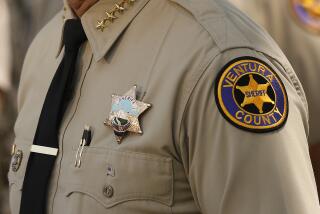THE SIMPSON MURDER CASE : Fugitive Relied On and Was Undone by Cellular Phone
The cellular telephone, which served as a lifeline for O.J. Simpson as he fled authorities Friday, also gave his pursuers crucial information on his whereabouts during a massive police manhunt.
AirTouch Cellular in Irvine, which provides cellular phone service in much of Southern California, helped the Los Angeles Police Department and other law enforcers track down O.J. Simpson, said Melissa May, a company spokeswoman.
May said law enforcement officers subpoenaed the company for assistance in tracking down Simpson. Technicians at a station in Orange County then began monitoring calls made by and to the car phone in the white Ford Bronco owned by Simpson’s best friend, Al Cowlings.
Even if an eyewitness had not spotted the vehicle on Interstate 5 in Orange County, such monitoring would have made Simpson’s capture inevitable as long as he continued to use the phone, experts said. The same method was used to track down drug lord Pablo Escobar in Colombia in December.
“If he used a cellular phone, that was his mistake,” said Michael Guidry, a security consultant with the Guidry Group in Houston. “Cellular tracking is extremely beneficial. It’s an (investigative) tool of the future.”
The incident underscores how pervasive the cellular phone culture has become in Los Angeles. Angelenos have relied on cellular to get them through traffic jams, earthquakes, road emergencies and--in Simpson’s case--to serve as a communications lifeline when other options are not available.
“The cellular phone used to be just a business tool when it appeared 10 years ago,” said Ron Nessen, spokesman for the Cellular Telecommunications Industry Assn. in Washington, D.C.
In a survey last year, two-thirds of cellular phone users said they buy the equipment for safety and security while more than half say they use it for personal reasons rather than for business, Nessen said.
Overall, 6% of the public, about 18 million customers, use cellular phones. Los Angeles, along with New York, is among the biggest markets in the nation.
Cellular phones work differently from regular phones connected to cables. When drivers dial a number from a car phone, a radio signal is sent to a nearby tower. The effective range of the towers (known as a cell) is small, usually a few miles in a crowded freeway area.
The tower sends a microwave radio signal or a regular phone line signal to a regional center known as a switching station. From there, the call is passed on to its destination through the land-line network or another cellular phone.
When a driver moves beyond the range of one cell, a computer in the switching station passes the call off to another cell.
Technicians in the switching station can, when necessary, track a particular call back to the cell site from which it originates. They can also track the phone numbers dialed by the cellular phone customer. But the monitoring cannot be done unless the phone is in use.
Frequently called numbers of Simpson’s known friends could have been monitored, Guidry said. Once Simpson called one of those numbers, the computer could have immediately traced it back to the cellular phone he was using, Guidry said.
Within a cell site, law enforcement officers such as SWAT teams and narcotics units often use triangulation equipment--scanners that use meters to detect the strength and origin of radio signals--to zero in on a particular caller, Guidry said. At that point, visual contact is possible.
Eavesdropping on cellular phone calls is illegal without a wiretapping warrant, even for AirTouch as it scans for cellular phone fraud. In Simpson’s case, LAPD investigators got a court order allowing them to track down the fugitive, May said.
“Under normal circumstances, we do not monitor calls,” AirTouch’s May said.
Some police scanners, which can be purchased by the public, can be used to monitor calls in a so-called analog cellular phone system, such as the one AirTouch operates.
All it takes is knowledge of the carrier’s frequency, which involves looking at records on file with the Federal Communications Commission.
Such eavesdropping is illegal and often taps only into random calls. AirTouch has begun installing a digital phone system (which scrambles phone calls in a computer language) that will prevent such unauthorized monitoring beginning in 1995, May said.
Simpson made a number of cellular calls during the early afternoon Friday after he was declared a fugitive, May said.
As long as Simpson remained on the phone, it is unlikely that he would have eluded authorities even if they lost sight of the Bronco. If he used the phone in an apartment, Guidry said, officers with triangulation equipment could have pinpointed his call.
More to Read
Sign up for Essential California
The most important California stories and recommendations in your inbox every morning.
You may occasionally receive promotional content from the Los Angeles Times.










